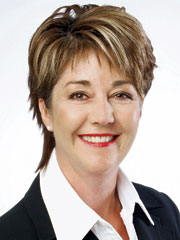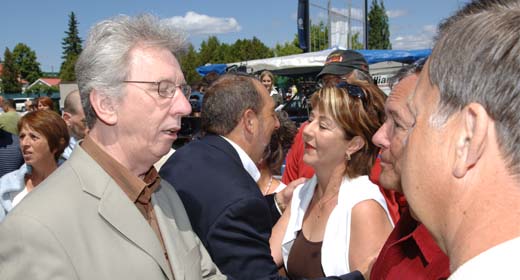This article by Campbell Clark of the Globe and Mail describing Defense Minister Peter MacKay’s comments on Afghanistan on CTV’s Question Period this past Sunday, left me a bit unsettled and confused.
OTTAWA — Canada has made it clear to its NATO allies that they cannot count on our troops to fight on the deadly battlefields of southern Afghanistan after February of 2009, Defence Minister Peter MacKay said yesterday.
“The signal that has been sent already is that our current configuration will end in February, 2009,” Mr. MacKay said in an interview on the CTV television program Question Period.
“Obviously the aid work and the diplomatic effort and presence will extend well beyond that. The Afghan compact itself goes until 2011,” he said. “But the way the mission is currently configured, with respect to our presence in Kandahar, there is an expiration date that has been set.”
This is a clear step forward from the Prime Minister’s earlier assertion that a consensus in Parliament would be needed to extend the mission – in it’s current state – past February 2009.
So, what is going on here? Is this what it seems? Is this surrender by the Conservative government on a key conservative principle?
The more I thought about it, the more I started to think about this announcement in a strategic way.
So, here’s my prediction:
Afghanistan is going to be the wedge issue during the next election to take place when the government puts the mission to a vote in Parliament. The vote will fail, the opposition will indicate its majority intention to withdrawal from Kandahar and the government will fall, because Harper will make it a confidence vote.
Why? Numbers.
As it stands, 50% of Canadians support the current mission in Afghanistan while 50% of Canadians do not. Harper needs about 40% of the vote to get a majority government.
MacKay’s announcement on Sunday does a few things. First of all, it indicates an utmost respect for Parliament as the mission and extension will still go to a vote (as indicated in Clark’s article). Secondly, it makes the opposition put down their guns on the Afghanistan issue for a while (continuous shelling of the mission puts it in a weak position in the forum of Canadian opinion). The opposition looks foolish when continuing to whine about the issue when the government has indicated that the mission (in the current parliamentary climate) cannot continue past February 2009. Third, it allows the government to prepare behind the scenes to sell the mission. The governing party has an advantage over the opposition parties in that it has two forums to spread its message, the House and outside of it. By indicating that the government recognizes that it is unlikely to win the Afghanistan mission vote, this disarms the opposition from consistently bringing it up in the House. Meanwhile, the government (the Conservatives) aim to sell it as an issue campaign across the country.
While the government recognizes it is unlikely to win an extension in Afghanistan, the Conservative Party will still maintain the position that an extension is in Canada’s interests and will advance that position up to the vote. There is a bit of a dichotomy here: Minister MacKay concedes the realities of the government’s minority position on the policy, while the politics of Conservatives will continue to lobby for an extension. By playing government minister, MacKay disarms the House (because the House checks the government, not the Conservative Party).
The Afghanistan extension is a perfect wedge issue for Harper. Only the Conservatives and the NDP have a clear position on the issue and only one can form government. The Liberals are bitterly divided on the issue. Ignatieff supports the mission in Afghanistan and Rae has indicated a tough on terror position in the past. Dion’s position is weak, somewhat against but certainly not for the mission. In fact, he has flip-flopped so many times in the past on the issue of Afghanistan. Of course, this plays into the Conservative narrative of weak leadership regarding Dion. Both Ignatieff and Rae are looking to topple Dion after an election, but concerning an extension as far away as 2009, this might be a wide enough window for both Rae and Ignatieff to act sooner rather than later. Harper’s strategy is to both create both a stronger NDP and a Liberal Party bitterly divided.
What other issue creates these winning conditions?
Afghanistan is a perfect issue to rally the conservative base, a reluctant group that has become angry over income trusts and only came out to vote in their champions in the wake of the biggest corruption scandal in Canadian history.
Regarding Quebec, I’m starting to think that the media’s read on Quebec voting intention regarding Afghanistan are overblown. I think that more Quebeckers would get out to vote for the mission than get out and vote against it come election day. Quebec remains a puzzle though despite Harper’s continuous attention to that province.
Speaking of which, Harper has also taken hits among the base for increased spending. Where, however, has this government spent? Childcare cheques, the military and transfer payments (fiscal imbalance) have been the shifted spending priorities of Canada’s New Government. The latter of which should help buffer some of that anti-military sentiment that the Toronto press believes that exists so pervasively in la belle province.
Back to leadership, this issue favours Harper in an electoral footing. Because he has a better control of the timing of an election, he will obviously define a ballot issue that favours his government and personal leadership. Afghanistan is a red meat issue while the environment is assorted mixed greens. Defining the election on Afghanistan favours Harper’s strong grizzle-laden leadership style, while the weaker Dion will be left sitting in vinaigrette. Harper is not going to willingly contrast himself in an election on any other issue. The only thing green that the Conservative Prime Minister hopes to talk about during the election is Dion’s leadership and that Dion “doesn’t have what it takes”, “isn’t a leader” etc.
Conservatives will also ask, “If Dion is a weak leader with an ambiguous stance on Afghanistan, is he ready to be Prime Minister?”
I believe that Conservative strategists are counting on a majority coming from NDP gains (hoping to catch that unambiguous 50% against the mission) and the bottom falling out on the Liberal party on Afghanistan and Dion’s leadership.



